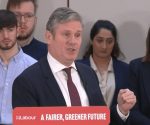Fake Brexit and the continuation of Globalism; Part One
Note: since the composition of this article began, the UK Government has released a White Paper in relation to negotiations it thinks it must have with the EU about Britain’s departure from that organisation. The author has glanced at it, and finds that in terms of stating what the UK Government hopes to achieve in key areas covered below, it is not much different nor any more definite or helpful than the sources that provide the material for this article.
Apparently, some people still think that the selected (by the pro-EU Establishment) Prime Minister of the UK – and Remain-campaigner – Theresa May, plus her (on the majority) pro-EU Parliamentary Tory Party (which stood down so she could be selected) are going to deliver the wishes of the people of the UK as expressed in the referendum on EU membership. They think that May is going to deliver a truly independent UK free of the EU. The truth of the matter – at least as it appears to the author – is that, if they’re lucky, they might get formal extraction of membership from the EU, but the UK will not be fully independent. What they are going to see, although they might not understand it, is the swapping out of aspects of EU membership with replacements that have more or less the same function toward furthering an integrationist agenda. Independence will be illusory.
So, how is it that we can make such a prediction so confidently? Because the people who rule Britain – and make no mistake, these aren’t the same people who were taking part in a debate in the Commons this past week (which the reader would have been wise not to have wasted any time paying attention to) – are Globalists, and Britain, for their sustenance and benefit, must be secured into a system of Globalism. The EU was supposed to be a shackle for this purpose. Now, even the born-again Brexit Avenger, Theresa May, is very concerned that the EU should survive the forces that the Leave movement in the UK represents – and this is because the EU is supposed to be a shackle. The UK only voted to Leave the EU by a miracle (it wasn’t meant to, and one day someone will get around to writing about that). There is no way that the UK is being divorced from the restricting influence of the EU while the same people rule Britain.
But we don’t need to rely on general prior knowledge. If we look at two speeches given recently and closely together by Theresa May, we can see what is intended. The first speech was the one touted as being a major policy exposition regarding the triggering of Article 50 and beyond, and it was given at Lancaster House on 17th January, the second was delivered to the World Economic Forum at Davos on 19th January.
We’re going to look at excerpts from these speeches over two articles, and discuss what they reveal (all quotations are from Theresa May unless otherwise stated). In this article, it is pointed out that the objective of the UK Government is continuance of Globalist standardisation, and how this perhaps means that what we should expect from Brexit is merely EU membership in everything but name. In the next article, we look at a plan for the future that the British Government has strangely stitched on to the delivery of Brexit, and notice that it confirms the desire for continuity in the Globalist scheme.
Before that, though, a note on the use of the word “globalisation” by Theresa May in the said speeches. According to Theresa May, globalisation is something that is good for lots of people, and that people would appreciate this if only they were taught that it was good for them. So, let’s just look at a definition of the word:
Globalisation: the process by which businesses or other organizations develop international influence or start operating on an international scale.
The problem is, who is doing the globalising? Is it Mom & Pop who are opening branches in another country? Or is it the expansion of a system of corporate government – or in other words, enlargement by people who are already immensely rich who want to govern on a global scale in order to sustain their dominance – i.e. people who want to rule the world? If it’s the latter case – and it most surely is – then what you have is Globalism. May uses globalisation when she means Globalism.
Let’s begin with the British Government’s concern about the survival of the EU project:
And I know many fear that… [Brexit] might herald the beginning of a greater unravelling of the EU.
But let me be clear: I do not want that to happen. It would not be in the best interests of Britain. It remains overwhelmingly and compellingly in Britain’s national interest that the EU should succeed. And that is why I hope in the months and years ahead we will all reflect on the lessons of Britain’s decision to leave.
The EU is a dictatorship. Its ruling executive branch is not elected. The great power in the EU is Germany; as such its politicians will have most influence on this rule-making body. Lesser countries cannot hope for rule in their particular best interests. The EU is expansionist; this is observable by comparing maps printed variously in the 20th century. EU expansion in to Ukraine involved a coup and the promotion of real Nazis into power, and a war on the people of the country’s culturally Russian provinces. The EU – having realised that American hard reinforcement can no longer be relied upon, and soft power is just not enough – wants to arm itself appropriately for its ambitions; Angela Merkel has said as much. The survival of the EU is not at all in the best interests of an independent Britain – and there are many reasons why, but here’s an important one: Britain is going to be attached to the EU in terms of military alliances and all that that entails:
At a time when together we face a serious threat from our enemies, Britain’s unique intelligence capabilities will continue to help to keep people in Europe safe from terrorism. And at a time when there is growing concern about European security, Britain’s servicemen and women, based in European countries including Estonia, Poland and Romania, will continue to do their duty.
I am proud of the role Britain has played and will continue to play in promoting Europe’s security. Britain has led Europe on the measures needed to keep our continent secure – whether it is implementing sanctions against Russia following its action in Crimea, working for peace and stability in the Balkans, or securing Europe’s external border. We will continue to work closely with our European allies in foreign and defence policy even as we leave the EU itself.
Well, if the reader lives in the real world then he or she will comprehend that Britain’s intelligence “capabilities” are one of the greatest progenitors of terrorism on the entire planet (and in its entire history), so the very important revelation in this statement is that Britain will continue to see Russia as an enemy on behalf of the EU. Again, we see the disgraceful lie about Crimea – the truth being that Crimeans voted to reconvert their land into Russian territory – to justify action to try and prevent Russia from being an economic threat to the EU. For it seems to the author that the potential of the Russian economy is at the root of all of this. It is deemed a threat. Russia won’t need to invade countries on its borders to create markets or find demographics that will seek closer ties. There are people in the East of Europe (not forgetting Greece) who are already very sympathetic to a Russia, which is trying to become an economically competitive trading nation while the EU is on the verge of full basket-case-hood. Market forces will drive the change of allegiances, and the duty of a British contingent of an EU “defence” force – or Army, if you like – will inevitably be more to do with preventing the disintegration and scattering of the EU into pieces than protecting anyone in it from Russian militarism.
Now let’s move onto the continuing primacy of EU law, and retention of elements of the Single Market and Custom Union membership.
And it is why, as we repeal the European Communities Act, we will convert the “acquis” – the body of existing EU law – into British law.
This will give the country maximum certainty as we leave the EU. The same rules and laws will apply on the day after Brexit as they did before. And it will be for the British Parliament to decide on any changes to that law after full scrutiny and proper Parliamentary debate.
And when it comes to Parliament, there is one other way in which I would like to provide certainty. I can confirm today that the Government will put the final deal that is agreed between the UK and the EU to a vote in both Houses of Parliament, before it comes into force.
The first thing one might notice is that May says that the European Communities Act is going to be repealed. UKIP’s Gerard Batten has this to say about that: “repeal[ing] the 1972 European Communities Act, [would] legally make us no longer members of [the EU] under our own law.” (Source). If that’s the case, why would we need all the palaver centred around the triggering of Article 50? The truth appears to be coming out. The essential act in leaving the EU is the repealing of the EC Act 1972. May the author suggest, then, that the triggering of Article 50 is to allow an opportunity for the British Government and the EU to conspire to create apparently new circumstances which amount to the same thing – or maintain the old relationship under a new name – to be sold to the British public as being necessary for leaving the EU? Here is how it would work: the EU will want this thing, the British Government will want that. A compromise will have be made or else, we will be told, Britain can’t leave the EU. Then there will be the second level. The British Government will take the compromise to Parliament, which is pro-EU, and will quietly have this compromise watered down some more – it will be necessary, you see, to get the whole thing passed – after all, leaving the EU is what you want, isn’t it? And all this is not to mention the possibility of an EU court deciding in the very end if Parliament has made a deal that is fudge enough to be acceptable to it.
So now let’s deal with that EU law that is in fact already on the books. As May points out, it would be for a British Parliament to rescind it bit by bit. That would be ok, as long as there was a Parliament willing to do such a thing. As the UK Parliament is essentially captured for the EU against the British Constitution, as revealed here, and is a pro-EU body, then Britain can expect to continue to be ruled by law that has emanated out of Brussels for the good of the EU, and in the interest of Globalist standardisation. And you can expect Parliament to continue to make law that runs parallel with any new legislation that Brussels makes. Globalism is about restricting a nation according to standardised requirements – even if it is a so-called independent legislature imposing the restriction. Real independence means doing what’s best for yourself, and insisting that the world accommodates you.
European leaders have said many times that membership [of the Single Market] means accepting the “four freedoms” of goods, capital, services and people. And being out of the EU but a member of the Single Market would mean complying with the EU’s rules and regulations that implement those freedoms, without having a vote on what those rules and regulations are. It would mean accepting a role for the European Court of Justice that would see it still having direct legal authority in our country.
It would to all intents and purposes mean not leaving the EU at all.
And that is why both sides in the referendum campaign made it clear that a vote to leave the EU would be a vote to leave the Single Market.
So we do not seek membership of the Single Market. Instead we seek the greatest possible access to it through a new, comprehensive, bold and ambitious Free Trade Agreement.
(This is the really important bit…)
That Agreement may take in elements of current Single Market arrangements in certain areas – on the export of cars and lorries for example, or the freedom to provide financial services across national borders – as it makes no sense to start again from scratch when Britain and the remaining Member States have adhered to the same rules for so many years.
The Single Market, then, is about the freedom of movement for goods, capital, services and people. It’s a free trade agreement that also incorporates the free movement of people, and a little bit more; for instance, the “non-tariff” “barriers to trade” which are rules for standardisation or practise, quality and other red-tape stuff. (We can bet the British Government is going to want to keep this, again because the EU has been a starting place for the Globalist regularised paradigm).
Now, it’s important to understand that Britain’s single market access depends on Brussels’ willingness to separate the four freedoms – and the sounds being made are not promising. Furthermore, the British Government has already revealed that the survival of the EU Single Market is a priority.
Because we do not want to undermine the Single Market, and we do not want to undermine the European Union. We want the EU to be a success and we want its remaining member states to prosper. And of course we want the same for Britain.
It makes one wonder how much negotiating space there is. Consider that immigration from the EU into the UK is a multi-billion pound cash-cow in terms of monies being transferred by individuals, and think about the remote chance of EU governments wanting to give that up. Indeed, the British Government might not be expecting it:
Fairness demands that we deal with another issue as soon as possible too. We want to guarantee the rights of EU citizens who are already living in Britain, and the rights of British nationals in other member states, as early as we can.
Putting aside that it is disingenuous to compare the case of millions and millions of EU citizens in Britain, and the much smaller number of Britons across an entire continent, what is this all about? Are we expecting, given the cash-cow mentioned above, for EU citizens suddenly to be deprived of public housing, benefits – in-work or not – and whatever else the British welfare state can think of to give out? Because, their technically being foreign nationals, we should expect the teat to dry up instantly. Foreign nationals used to have the following stamped on their passports when they were given leave to remain in the UK: no recourse to public funds. However, the author doubts very much that this is going to happen, and the rights of EU citizens will include one to continue to cost the British tax payer billions of pounds every year (17bn to be precise, according this report).
The EU should ‘do its best to undermine the “homogeneity” of its member states’ said Peter Sutherland, the UN migration chief in 2012. Sutherland, who had been the non-executive chairman of Goldman Sachs International and a former chairman of oil giant BP, thinks that the prosperity of a country is subject to its being multicultural. In fact, what he’s talking about is that the prosperity of Globalists like him and his ilk is at risk if nations do not disintegrate into balkanised, poverty stricken, tribal collectives that can be manipulated in order to provide his enrichment. A constitutional nation, with a unifying identity under a set of commonly-held principles, can see and fend off threats to its way of life (this is Patriotism). Globalism demands an end to unified national and cultural identity. A tool to that end is mass immigration.
And so the author senses already that the invasion of Britain is not even going to be reversed, and that a new agreement with the EU will involve the continuation – even if it be covertly done by allowing further immigration along familial lines – of nation-destroying free movement of people.
Moving on to the issue of a Customs Union, which is concerned with uniform tariffs on goods imported into the EU area from external countries:
I know my emphasis on striking trade agreements with countries outside Europe has led to questions about whether Britain seeks to remain a member of the EU’s Customs Union. And it is true that full Customs Union membership prevents us from negotiating our own comprehensive trade deals.
Now, I want Britain to be able to negotiate its own trade agreements. But I also want tariff-free trade with Europe and cross-border trade there to be as frictionless as possible.
That means I do not want Britain to be part of the Common Commercial Policy and I do not want us to be bound by the Common External Tariff. These are the elements of the Customs Union that prevent us from striking our own comprehensive trade agreements with other countries. But I do want us to have a customs agreement with the EU.
Whether that means we must reach a completely new customs agreement, become an associate member of the Customs Union in some way, or remain a signatory to some elements of it, I hold no preconceived position. I have an open mind on how we do it. It is not the means that matter, but the ends.
Look at the content of a tweet issued by the BBC’s Newsnight (source):
“I don’t think that you can do that” – @GuyVerhofstadt on whether the UK could be outside customs union but have a deal for car industry
The issue being referred to is how “the car industry” (when you look at this particular Guardian story, this talk emanates from the chief executive of the Society of Motor Manufacturers and Traders) is concerned that the EU will demand a customs tariff that will make UK car manufacture uncompetitive. But this application of tax would be reciprocal, and as such a deterrent. Germany is the country that exports the most to the UK; its car manufacturers don’t want retaliatory hefty tariffs on exports into the UK as a consequence. So we should suspect that what we have here is actually an exercise of deception with three elements: a) there is the establishment of a position taken by the EU whereby there appears to little or no movement, b) there is a creation of a scare that gives the UK Government an impetus or excuse on moral grounds to surrender to the EU (when actually it doesn’t need to), and then c) the UK Government is justified in the eyes of a nation when it signs up to a disadvantageous Customs Union.
Here’s some more from Guy Verhofstadt, the chief EU Brexit negotiator:
“I think this will not happen. We shall never accept a situation in which it is better to be outside the single market than be a member of the European union,” Mr Verhofstadt said.
“If you want the advantages you of a single market and customs union, you have to take the obligations,” he added.
Here we have the chief EU negotiator setting out a position of inflexibility. People are being set up to understand that the British Government will have to do a deal that might not conform to ideal notions of total independence. Let’s look at an actual case (from here):
The EU also has separate customs union agreements with Turkey, Andorra and San Marino.
Turkey’s agreement covers industrial products and processed agricultural products.
That means Turkey has to impose the common external tariff and meet EU regulations on its industrial products, but not its unprocessed agricultural ones.
So when Turkey negotiates trade agreements with other countries, it still has to impose the EU’s external tariff on industrial products and processed agricultural products (unless those countries also have trade deals with the EU).
It’s also a one-sided agreement, with non-EU countries that have free trade agreements with the EU automatically getting access to Turkish markets although Turkey does not get access to theirs.
And it means that on the products covered by the agreement, Turkey must keep to EU regulations.
The stench of EU protectionism is unmistakable. What could the British people need so badly from the dying, stinking corpse of the EU in order that they would see their country retain its vassal status? The UK Government is going to have to be at its most inventive.
Let’s recap on what to expect to happen: a) the setting out of the EU’s position whereby there appears to be little or no flexibility, b) the creation of a scare that seemingly causes the UK Government to surrender to the EU, and then c) the UK Government being justified in the eyes of a nation when it signs up to a deal that is not in its best interests. This is how Theresa May and David Davies, and all the other fakers in the Tory party are going to deliver Fake Brexit.


















